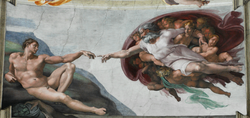After Jesus had finished all his sayings in the hearing of the people, he entered Capernaum. 2A centurion there had a slave whom he valued highly, and who was ill and close to death. 3When he heard about Jesus, he sent some Jewish elders to him, asking him to come and heal his slave. 4When they came to Jesus, they appealed to him earnestly, saying, “He is worthy of having you do this for him, 5for he loves our people, and it is he who built our synagogue for us.” 6And Jesus went with them, but when he was not far from the house, the centurion sent friends to say to him, “Lord, do not trouble yourself, for I am not worthy to have you come under my roof; 7therefore I did not presume to come to you. But only speak the word, and let my servant be healed. 8For I also am a man set under authority, with soldiers under me; and I say to one, ‘Go,’ and he goes, and to another, ‘Come,’ and he comes, and to my slave, ‘Do this,’ and the slave does it.” 9When Jesus heard this he was amazed at him, and turning to the crowd that followed him, he said, “I tell you, not even in Israel have I found such faith.” 10When those who had been sent returned to the house, they found the slave in good health.  Who is this slave so highly valued? Is it woman or a man? And for what is the slave valued? the slave's craft? the slave's diligence? work ethic? friendship? Had the slave become a confidant? Or a member of the family? Who is this slave? What role does the slave play in the centurion's life? I imagine the centurion having lit dozens of candles, said hundreds of prayers until he heard about Jesus. At first the centurion sends elders, presumably because Jesus might respond to the authority of the elders. Maybe. That certainly tweaks our picture of Jesus and it adds to the meaning of authority in this passage - which seems to be part of the passage's meaning. He sends the elders who argue on behalf of this Gentile. It's an interfaith community. They say to Jesus, "He deserves to have you come to him because he has built our synagogues." And Jesus listens to the elders, following them to the man's home.  But something must've happened at the centurion's home, some conversation among his friends have convinced him not to bother Jesus in this way. So his friends intercept Jesus and the elders, saying "you don't have to come to the house... say the word and the slave will be healed." Where the elders made the case that the centurion is worthy of Jesus' company, his friends argue a different angle. At first glance, perhaps the centurion was trying to save face for Jesus - He really shouldn't be in the home of a Gentile after all. At second glance, I wonder if the centurion wasn't connecting the authority Jesus has with his own authority, creating a sense of equanimity between them. At third glance, maybe Jesus entering his home was simply too intimate. Of course all of these glances are guesses or interpretation. Amazed by the centurion's faith, the Gentile's faith, Jesus granted the long distance healing of this highly valued slave. Who was this slave? Did Jesus ever meet him or her personally - the one that mobilized elders and friends and faith?
0 Comments
Does not wisdom call  Lady Wisdom - Do you see her? She's at the front of the Memorial Day parade at a town nearby. At least that's how I see her. She's dressed in worn jeans and a favorite, comfortable shirt. And of course she wears hat, to shield the sun so that she can see everything as clearly as possible. Unlike Lady Liberty - sculpted out of copper, standing strong as she welcomes the poor, the tired and those yearning to breathe free. Lady Wisdom is sculpted of flesh that feels the warm breeze at the parade. Her feet only as secure as the muscles in her legs. Lady Wisdom doesn't stand at the doorway welcoming others - she has a voice. She calls out. Lady Wisdom is also unlike the blindfolded Lady justice - balanced in her stance, always judging righteousness. Lady Wisdom sees, she watches, "I have insight" she says. Did you know that there is a woman beside the Creator God of the Cistene Chapel?  There she is - beside God, surrounded by cherubs. Is that Lady Wisdom? Her flesh explosed, her hair golden and her eyes fixed. Fixed on the creation to be. Is her gaze certain? Or perhaps she's taking in every ounce of experience. Wisdom is said to be Knowledge + Time. Wisdom comes with scars typically. Wisdom comes from having lived through and in and with and despite. Wisdom is not clean. Wisdom digs in and forages for knowledge. Lady Wisdom walks beside the town's marching band, noticing each student. She walks beside the mayor's convertible and talks with his grand daughter. Lady Wisdom stops at the old couple's house on the parade route - to shake hands? to feel wrinkled skin? She doesn't mind having to catch up with the parade. Lady Wisdom sees the boundaries around us - us who live in skin. She sees the young, the old, the sick, the well, the poor, the wealthy, the strong, the weak, the tired, the rested, the secure, the frightened. When the music has ended and the speeches have all been made, I imagine she slowly makes her way to the crossroad again. 16One day, as we were going to the place of prayer, we met a slave girl who had a spirit of divination and brought her owners a great deal of money by fortune-telling. 17While she followed Paul and us, she would cry out, “These men are slaves of the Most High God, who proclaim to you a way of salvation.” 18She kept doing this for many days. But Paul, very much annoyed, turned and said to the spirit, “I order you in the name of Jesus Christ to come out of her.” And it came out that very hour. 19But when her owners saw that their hope of making money was gone, they seized Paul and Silas and dragged them into the marketplace before the authorities. 20When they had brought them before the magistrates, they said, “These men are disturbing our city; they are Jews 21and are advocating customs that are not lawful for us as Romans to adopt or observe.” 22The crowd joined in attacking them, and the magistrates had them stripped of their clothing and ordered them to be beaten with rods. 23After they had given them a severe flogging, they threw them into prison and ordered the jailer to keep them securely. 24Following these instructions, he put them in the innermost cell and fastened their feet in the stocks.  Today, our story begins with Paul and Silas on their way to a prayer meeting. They're minding their own business and a young woman begins to call out to them, “these are men serve the most high God.” Why is she calling out to them like that? Why? She was enslaved. Her owners didn't even notice that she was calling out to Paul and Silas. It even says that Paul and Silas didn't notice what was going on – they were just annoyed. The idea of a woman without freedom calling out to others with freedom is not only a story in the Bible. Thank God that Paul and Silas, our examples of those living by the Spirit, finally hear her and respond by offering her freedom. Under the subtitle of “no good deed goes unpunished” Paul and Silas are arrested, beaten and imprisoned. Why? Politics and money. The woman's owners had connections. The story says that they began to sing. Who started the singing? I mean really fellas, I love to learn from your example. Are you telling me when we find ourselves stuck, we ought to sing happy songs? I had a friend in college who if we were being too negative, we would make one another list 3 things for which we were thankful. You know when you're in a bad mood, that's neither fun nor easy. I'd often roll my eyes and say something like “I'm thankful for peanut butter.” Something magical happens though when we allow ourselves to rise above ourselves and our circumstances. An ordinary act of gratitude or joy or thankfulness turned into an extraordinary act of freedom... an earthquake. Paul and Silas were no longer imprisoned. Paul and Silas didn't make a run for it. The jailor – who had beaten them remember – he saw what happened and assumed that the prisoners had escaped. He was about to kill himself when our heroes called out to him. Hey don't do that. And the jailor asks, “how might I be saved?” How do I rise above this world filled with its prisons? Economic, political, family systems, daily grind, disappointments, failures. How do I rise above? |
Search this blog for a specific text or story:
I am grateful for
|

This work is licensed under a Creative Commons Attribution-NonCommercial-ShareAlike 3.0 Unported License.
